Dekmantel 2014: 10 Reasons the Amsterdam Festival Was One of the Year’s Best
Last August, XLR8R hopped on a plane to Amsterdam to check out the inaugural Dekmantel […]
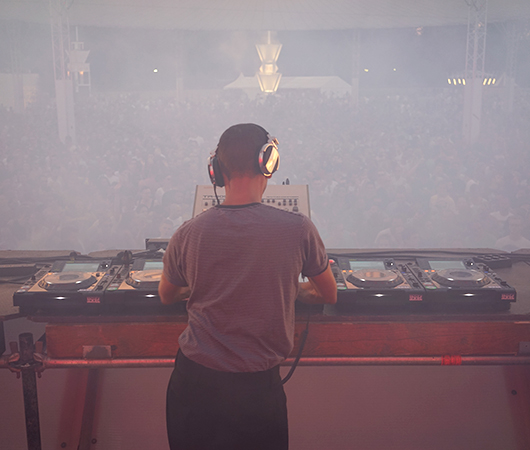
Dekmantel 2014: 10 Reasons the Amsterdam Festival Was One of the Year’s Best
Last August, XLR8R hopped on a plane to Amsterdam to check out the inaugural Dekmantel […]

Last August, XLR8R hopped on a plane to Amsterdam to check out the inaugural Dekmantel Festival. At the time, our expectations were high, but we weren’t quite sure what to expect; the line-up was certainly good, and the Dekmantel crew had a solid reputation, but launching a new festival, let alone doing it right, can be a rather difficult undertaking. Nevertheless, the first Dekmantel Festival was an unabashed success, which we detailed in our official review. Intimate in feel, well run, and marked by impeccable curation, the event felt truly special; more importantly, it set an incredibly high standard for the future. As such, we arrived in Amsterdam last week with high hopes, but also with a nagging worry that Dekmantel’s 2014 might not live up to the promise of its predecessor. However, now that we’ve spent another three days at the wooded Amsterdamse Bos site just outside the city, it can be said with confidence that our trepidation was absolutely for naught. As it turned out, this year’s Dekmantel was just as good, if not better than, the first.
Without completely repeating our observations from last year, Dekmantel deserves a lot of credit for its ability to plan and run a festival properly. On a basic level, the line-up was excellent to a point of near absurdity, offering an embarrassment of riches for electronic music fans, especially those who favor Detroit classics, various strains of techno (both the Berghain and UK camps were well represented), boundary-pushing house, and extended sets from top-notch DJs. From a logistical standpoint, there was also little to complain about, despite the fact that organizers added an additional stage and effectively doubled the festival’s capacity this year. Dekmantel’s layout was altered slightly from last year, but its intimate feel remained intact—one could easily traverse the grounds in about five minutes. More importantly, even with all of the extra bodies, things rarely felt overcrowded. Entering and exiting stages was easy, and attendees could usually wind their way to the front of the crowd without exerting too much effort. Even the food and drinks lines were short; grabbing a beer or a snack didn’t involve abandoning the musical action for an hour at a time. Basically, being at Dekmantel was a comfortable experience, and one that was free of the oppressive claustrophobia that is so often a part of attending a festival. This comfort also extended to the sound quality, as the festival’s numerous Funktion One rigs usually provided the necessary sonic heft without splitting anyone’s ears. (There was a little too much bleed from the Selectors stage into The Woods, but this was generally inconsequential, save for during a handful of the latter stage’s especially quiet moments.)
Robert Hood
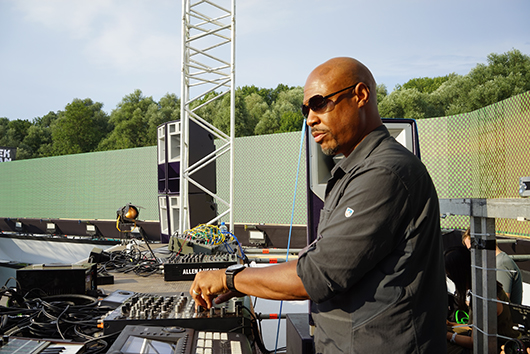
Most importantly, we were happy to see that the Dekmantel crowd hadn’t changed significantly from one year to the next. In fairness, the 2014 edition may have been a little younger, and a little less Dutch, than last time, but following the glowing reviews of last year’s festival, there was some concern that Dekmantel could be the victim of a full-blown lad invasion. Much to our delight, although the crowd did feature plenty of young people in search of a good time—an alarming number of them looking like they had graduated from the Disclosure school of fashion—those in attendance were generally friendly, mellow, and seemingly there for the music. Once again, Dekmantel’s daytime hours—the festival ran from 1 p.m. to 11 p.m. each day—helped to keep folks in check, as things wrapped up before most people could get too messy. In short, the festival atmosphere was still a friendly one, and this is a real testament to Dekmantel’s organizers and the clarity of their vision. Rather than cashing in on the hype, the crew has stuck to its guns while responsibly growing its event, which led to a weekend full of wonderful moments. Some of our favorites included Magic Mountain High‘s improvisational techno jam, Young Marco‘s Balearic explorations, Daphni‘s quietly anthemic melodics, and Space Dimension Controller‘s lovably irreverent antics (he played both Yello’s “Oh Yeah”and a disco rework of the Star Wars theme). In truth, recounting all of the festival’s high points would be impossible, but we’ve put together a list of 10 things that made Dekmantel 2014 an especially excellent affair.
Daphni
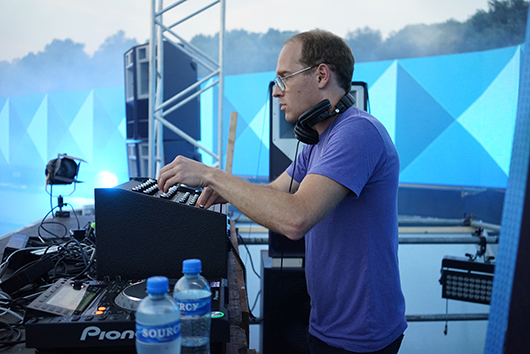
Jeff Mills
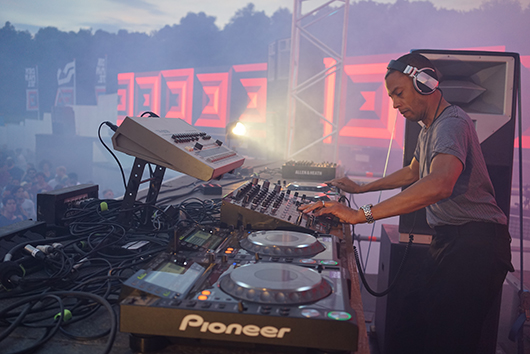
The Wizard was in top form.
This year’s Dekmantel line-up pulled heavily from the world of techno, and Sunday was particularly focused on the genre, especially with the Ostgut Ton/Berghain crew taking over the XLR8R UFO tent for the whole day. Over at the main stage, the afternoon featured a live set from Robert Hood and a storming DJ session from Surgeon, both of whom were impressive, but the true techno star of the day was Detroit legend Jeff Mills, who closed out the festival with an absolutely brilliant set. Operating four CDJs and a Roland TR-909, Mills assembled pieces of hard techno—often on the fly—that featured both booming rhythms and delicate, slightly melancholy melodies that were strikingly beautiful. Watching him work, it was clear that he’s become a true master of the craft, particularly when it comes to the 909. Where many artists treat the revered drum machine as some sort of museum piece, Mills sees it as a proper instrument; he’s clearly familiar with every one of its idiosyncrasies, which enables him to be not just a player, but a legitimate virtuoso. As such, there was a noted precision to his music, which only deepened its impact. Hearing Mills’ rich, multilayered sounds as the sun went down, it was hard to imagine a better way to wrap up the official Dekmantel festivities.
Joey Anderson
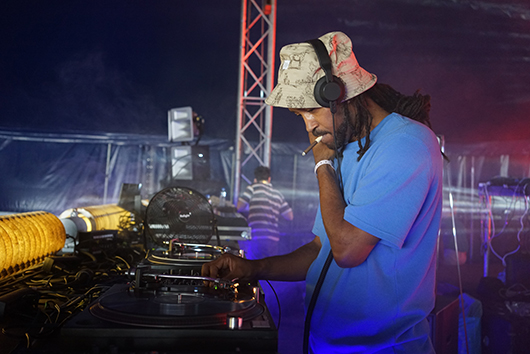
Joey Anderson might have delivered the best set of the festival.
New Jersey’s Joey Anderson has been on a major hot streak over the past year or so, and during that time, he’s become a member of the extended Dekmantel family, as the festival’s label arm issued his debut album, After Forever, earlier this year. Given that, it was no surprise to see Anderson at this year’s festival, and he actually performed twice during the weekend—on Saturday afternoon inside the XLR8R UFO tent, and again on Sunday at the Boiler Room stage. Right away, his set grabbed our attention, as Anderson wove an intoxicating web of druggy, dubby, and psychedelic house and techno. The music’s hazy atmosphere perfectly suited the tent’s muggy interior, a phenomenon that was only intensified by a few thunderstorms that afternoon. Once the rain began pouring down, the tent temporarily filled to the brim, the energy on the dancefloor spiked, and the cheers and whistles for Anderson’s music grew increasingly louder. The reverberating waves of his selections continued to wash over the dancefloor, and even as the skies cleared and the sun reluctantly emerged during the final minutes of his set, the throngs of dancers stayed put and ravenously asked for more.
Gerd Janson
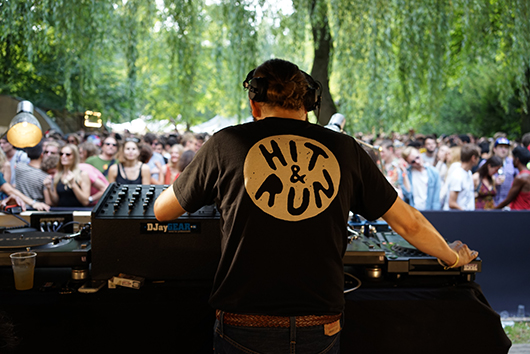
Mood Hut
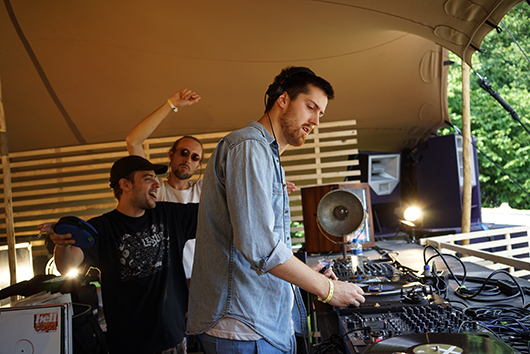
Mood Hut lived up to the hype.
In recent months, the excitement surrounding Vancouver’s Mood Hut collective has become increasingly intense, so it was nice to see that Dekmantel managed to bring both Hashman Deejay and the Pender Street Steppers to the festival. The three artists DJed together on Friday afternoon at The Woods stage, filling the sunny afternoon air with a remarkably cohesive and undeniably upbeat set of vintage house grooves. The Mood Hut sound has a lot of funk to it, but over the course of two hours, the trio also touched on Balearic melodies, elements of disco and R&B, and various shades of classic house. Without question, the tunes were excellent, but what really sealed the experience was seeing just how much these guys clearly loved all of the music they were playing. All three members were dancing and singing along to just about every track; their passion was obvious, as was the fact that these guys have spent a lot of time DJing together. Simply put, Mood Hut was a lot of fun, and more than worthy of the accolades that have been thrown in the crew’s direction as of late.
Ben UFO
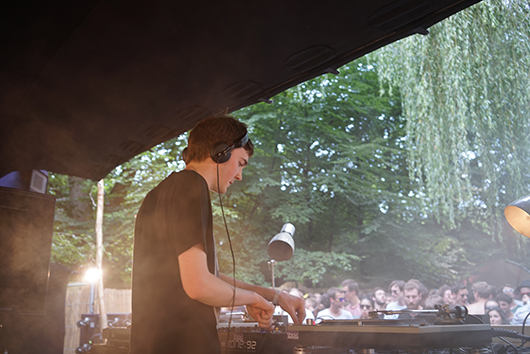
As usual, Ben UFO was stellar.
Surprise, surprise. We went to another festival and were blown away by the DJ stylings of Ben UFO. The storyline may not be an original one, but once again, it’s 100% true. At this year’s Dekmantel, Ben UFO was another artist tasked with double duty. His first performance took place on Saturday afternoon at the main stage, where he spun in tandem with his Hessle Audio compatriots Pearson Sound and Pangaea. That set, while a bit disjointed, was certainly enjoyable, but it was actually Ben UFO’s second go-round, in which he played alone at the Selectors stage on Sunday afternoon, that was truly special. (Side note: the Selectors stage may have been the festival’s best, at least in terms of sound and overall vibe. During the course of the weekend, the tree-lined area played host to a number of DJs’ DJs, including Optimo, DJ Harvey, DVS1, and Gerd Janson vs. Prins Thomas.)
Following an opening set from Sweden’s Rivet that was honestly a bit too raucous for a sun-streaked early afternoon, Ben UFO expertly righted the situation, smoothing things out within the first few minutes before spending the next three hours gliding between assorted strains of house, techno, garage, and more. There are plenty of DJs who bring deep crates and a lot of knowledge to the DJ booth, but there’s something exceptional about Ben UFO’s ability to take seemingly disparate sounds and flawlessly blend them together. At the same time, he also maintains a larger, panoramic vision for his sets as a whole, which ensures that there’s more going on than simply moving from one song to the next. On Sunday afternoon, it was clear that Ben UFO was taking us somewhere, and the stuffed dancefloor was happy to come along for the ride.
Marcellus Pittman and Rick Wilhite of Three Chairs
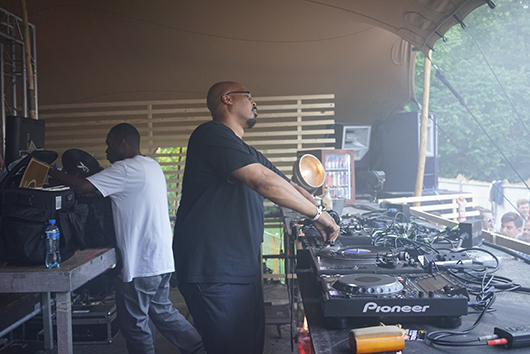
Theo Parrish of Three Chairs
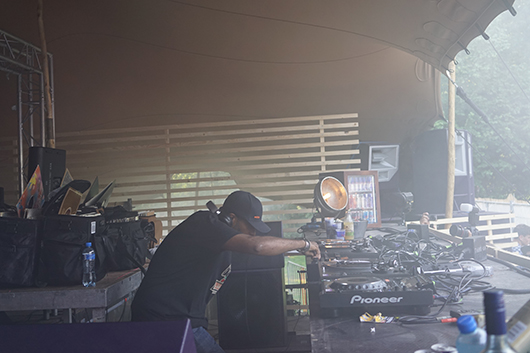
Three Chairs provided a lot of Detroit star power.
The second day of Dekmantel got off to something of a rough start, as the previously mentioned thunderstorms brought safety concerns that prompted festival organizers to temporarily close three of the five stages for a few hours. As a result, a few sets were cancelled altogether or cut short, including a joint DJ session from Kyle Hall and Jay Daniel. Luckily, Three Chairs (a.k.a. the all-star quartet of Moodymann, Theo Parrish, Rick Wilhite, and Marcellus Pittman) was slated to close out The Woods stage that evening with a six-hour set, and the group decided to invite Hall and Daniel to play with them. As such, the Three Chairs set became a sort of intergenerational showcase featuring six of the Motor City’s finest DJs. Not surprisingly, it was also an undeniable festival highlight. With so much time on their hands, the DJs had plenty of time to explore, and their set included extending trips through funk, soul, jazz, house, techno, electro, and disco. In truth, the whole thing was something of a history lesson, albeit one that invariably maintained a loose feel and an upbeat, block party vibe, regardless of whether an extended funk cut or techno classic was being played. Our profile of Dekmantel’s organizers last week mentioned that Three Chairs was the first act booked for this year’s festival, and after seeing this assemblage of talent on one stage, it was easy to see why.
Shackleton
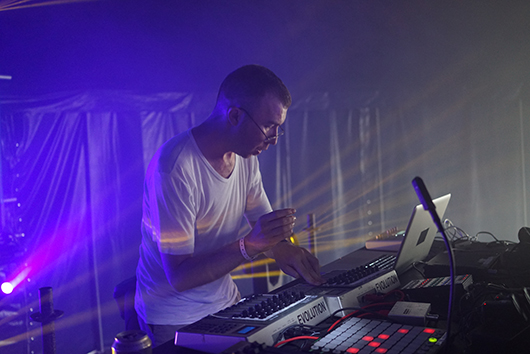
Shackleton was weird and wonderful.
At this point, it’s almost impossible to properly classify the music of Shackleton. Dubstep may be a reference point, but the UK-born producer’s output also incorporates tribal polyrhythms, frequent nods to techno, and hard-to-describe experimental flourishes. There’s simply no one else quite like him, which is part of what made his live performance in the XLR8R UFO tent such a triumph. Coming on after Joey Anderson’s triumphant set, the pressure was on, but Shackleton took it in stride and delved into his usual pool of weird, otherworldy electronics. And it worked—with all of the humidity in the air following the day’s thunderstorms, his vaguely tropical creations were just about perfect for a sweaty afternoon dance session, and he provided just enough of a techno backbone to keep the dancefloor moving. The intricate, intellectual nature of Shackleton’s production can sometimes be a bit too heady for a proper dance party, but at Dekmantel, something just clicked, and countless dancers could be seen feverishly wriggling and writhing to his left-of-center creations. It was an encouraging sight, and one that hammered home why the festival was so good.
Magic Mountain High
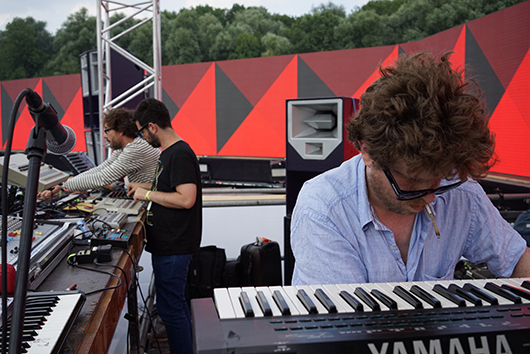
Traxx
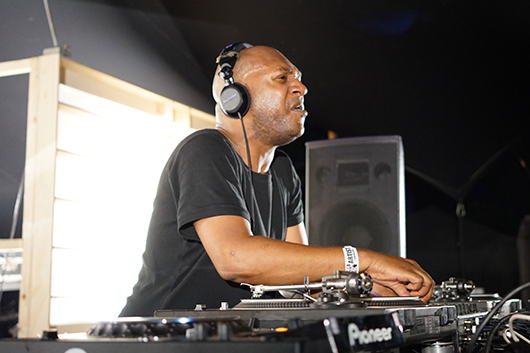
Traxx played like a madman.
Traxx isn’t for everyone. The veteran Chicago DJ is known for his raw, abrasive DJ style and complete lack of fear in the booth. His sets aren’t for the faint of heart, but that didn’t seem to matter on Saturday evening when Traxx closed out the Selectors stage with a wild two-hour set. Per usual, he played a lot of stripped-down house and acid, but he also folded in pieces of industrial, noise, and even a passage of Martin Luther King’s “Drum Major Instinct” speech, all of which took place at a stunningly loud volume. As the set continued, there was no break or respite; this was more like an assault, and the only thing more unhinged than the music on offer was Traxx himself, who thrashed and danced with reckless abandon. Dekmantel had plenty of highlights, but seeing Traxx was a genuine thrill, and at a festival largely populated by overly precise and well-mannered sounds, he provided an exciting change of pace.
Levon Vincent
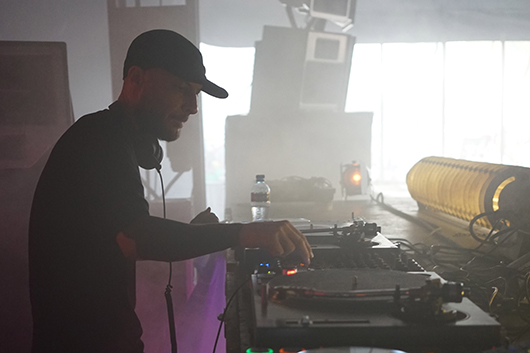
Levon Vincent rewarded our patience.
Talking to various festival attendees throughout the weekend, many people who saw Levon Vincent on Friday afternoon in the XLR8R UFO tent were disappointed. The common refrain was that Vincent spent too long building momentum, or that his selections were too weird and experimental. Without being too contrarian, all we can say is that we completely disagreed with this assessment. Seeing Levon Vincent shouldn’t be about waiting for big tunes or dancefloor-friendly tracks; his willingness to blur boundaries and test the limits of traditional house and techno is a big part of what makes his musical vision so singular and unique. Moreover, when it comes to DJing, Vincent is someone who appreciates a long-form musical narrative. He may take unusual forays while incorporating elements of dub, noise, and tribal sounds, but those familiar with his work know that he’s always going to get around to the big tunes—this is the man who wrote (and will still play) “Man or Mistress,” after all—but before that time arrives, it’s generally safe to assume that he’s going to muck things up and get a bit experimental. That was certainly what happened at Dekmantel, so perhaps those who only witnessed the first half (or even just a portion) of his set were left perplexed. However, those who were willing to follow Vincent along his entire path were handsomely rewarded during the final 30 to 40 minutes of his two-hour set, as he broke out big and brash slices of house and techno that elicited cheers and set the dancefloor alight.
Space Dimension Controller
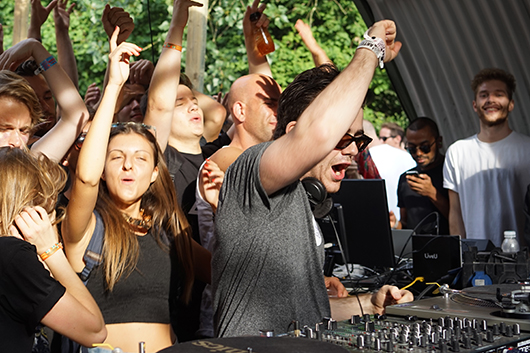
Talaboman (John Talabot and Axel Boman)

Despite the goofy name, Talaboman proved that it’s a project that deserves to be taken seriously.
For many people, John Talabot‘s and Axel Boman‘s collaborative Talaboman project is merely a creative lark, a silly side project from a couple of established producers looking to have a little fun. The duo’s first single, “Sideral,” which first appeared on Talabot’s DJ-Kicks last year and is finally due out this month, doesn’t detract from that notion with its light-hearted shuffle and tweaky melodies. If nothing else emerges from the partnership in the months and years ahead, few people would be surprised, but after seeing the two DJs play together on Friday evening at Dekmantel’s main stage, we found ourselves hoping that they do manage to find the time and energy to keep working together. Back in June, we saw a Talaboman DJ set during Sónar week in Barcelona, and while it was fun, it largely came off like Talabot and Boman getting together to play some records. But now, a couple of months and several Talaboman shows later, something new and decidedly distinct from the two producers’ solo efforts seems to have emerged. Watching their set at Dekmantel, one could detect the sunny melodies and organic percussion that often colors both Talabot’s and Boman’s music, but there was also a strong emphasis on tribal, almost African rhythms. The music was big and bright, but the drums were surprisingly at the forefront of the proceedings, to glorious effect. Admittedly, it could have all been a fortuitous coincidence, or perhaps Talabot and Boman have merely sharpened up their DJ crates for these back-to-back sets, but to our ears, it seemed clear that the pair had stumbled on to something potent.
Hessle Audio (Pangaea, Pearson Sound, and Ben UFO)
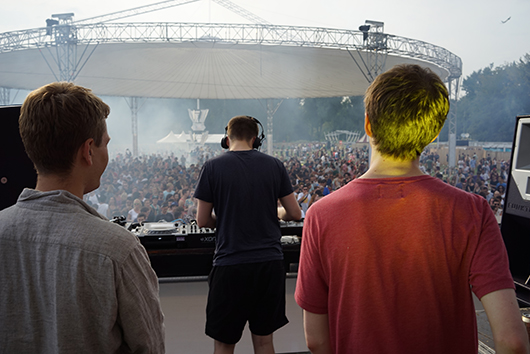
The fun didn’t stop when the festival came to a close.
After a long day in the sunshine, Dekmantel’s 11 p.m. closing time was a refreshing change of pace from the all-night raving championed by many electronic music festivals. That said, its organizers were smart enough to recognize that not everyone in attendance was looking for a breather once the sun went down, and made sure to program a series of afterparties with the same kind of impeccable curation that characterized the festival proper. Each night, there were parties at both Trouw, a club that is generally recognized as Amsterdam’s best, and the newly built Volkshotel, which was conveniently located right across the street. Over the course of the weekend, both venues offered top-notch line-ups that included the likes of John Talabot, Optimo, Marcel Dettmann vs. Ben Klock, San Proper, Gerd Janson vs. Prins Thomas, Mala, Joy Orbison, and others.
However, of all the performances we saw during the wee hours, two stood out. On Saturday at Volkshotel, Livity Sound performed live and the group’s bass-driven techno hybrids sounded amazing. The UK trio’s debut album from last year was an impressive piece of work, but in the live setting, the music was particularly rich and layered; moreover, it exuded a rolling, almost sexual undertone that bared traces of Bristol’s soul-drenched past. From a musical standpoint, it was definitely the best thing we saw at the Dekmantel afterparties. However, purely in terms of vibe, it was hard to beat Tama Sumo‘s set in the Trouw basement on Sunday night. At that point, the official festival had come to a close, and it seemed like just about everyone in attendance had come away beaming. The party at Trouw was essentially the weekend’s final hurrah, and both festival attendees and staff members could be seen in the crowd, celebrating what was by all accounts a successful event. As the hour grew late, Marcel Dettmann and Ben Klock were jointly (and enjoyably) banging away upstairs, but somehow, Tama Sumo’s lively house selections seemed like the perfect soundtrack, not only for the collectively joyous mood, but for celebrating Dekmantel’s continued ascension into the top tier of electronic music festivals.

